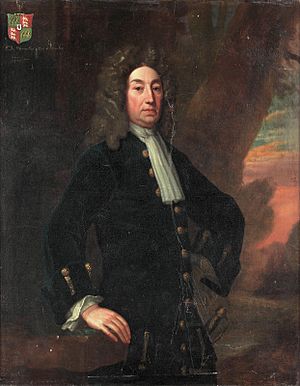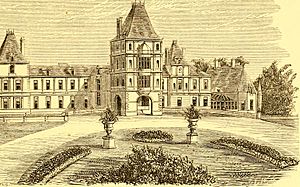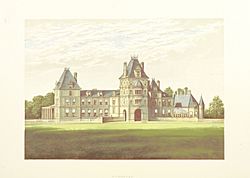Sir John Wynn, 5th Baronet facts for kids
Sir John Wynn, 5th Baronet (born in 1628 and passed away on January 11, 1719) was an important landowner from Wales. He was also a politician who belonged to the Tory party. He served in the English House of Commons and later the British House of Commons between 1679 and 1713. This means he helped make laws for England and then Great Britain.
Contents
Early Life and Family
John Wynn was the only son of Henry Wynn, who lived in Rhiwgoch, Merioneth. He studied law at a place called the Inner Temple in 1646.
He became the owner of the Watstay Estate when he married Jane Evans. She was the daughter of Eyton Evans of Watstay. John Wynn later changed the estate's name to Wynnstay. There's a fun story that he also won a piece of land called the manor of Stanwardine in Shropshire. He supposedly won it from Thomas Corbett in a snail race!
In 1674, John Wynn became a Baronet. This was a special title he inherited from his cousin, Sir Richard Wynn, 4th Baronet. However, he did not inherit the Gwydyr Estate. That estate went to his cousin's daughter, Mary. She later married Robert Bertie, 1st Duke of Ancaster and Kesteven.
His Public Service
Sir John Wynn held several important jobs in his local area. He was the High Sheriff of Denbighshire from 1671 to 1673. He also served as High Sheriff of Caernarvonshire from 1674 to 1675. Then, he was the High Sheriff of Merionethshire from 1675 to 1676. A High Sheriff was like a chief law enforcement officer for a county.
He was also the Custos Rotulorum of Merionethshire for several periods. This job meant he was the main keeper of the county's records and in charge of the local court system. He held this role from 1678 to 1688, then 1690 to 1696, and again from 1700 to 1711.
Time in Parliament
Sir John Wynn was chosen to be a Member of Parliament (MP) for Merioneth in 1679. An MP is someone elected to represent people in the country's main law-making body. He was elected again in 1685 and kept his seat until 1695.
Later, in the 1698 English general election, he was elected as an MP for Caernarvon Boroughs. In the 1705 English general election, he was elected without anyone running against him for Caernarvonshire. He was elected again without opposition in the 1708 British general election and the 1710 British general election. He decided to stop being an MP in 1713.
Later Life and Legacy
Sir John Wynn lived to be over ninety years old. He mostly lived in London during his later years. He passed away in 1719 and did not have any children.
When he died, the Wynn baronetcy title ended because there were no direct heirs. His family, the ancient House of Gwynedd, was a very old and important Welsh family. They believed they were directly related to Rhodri Mawr, a famous ruler from the 9th century. With Sir John's death, this long family line seemed to end without any known male relatives.
Who Inherited the Estate?
There were some ideas about who might have been a distant relative. For example, some people thought that Thomas Jones (Twm Siôn Cati) might have been a son of John "Wynn" ap Maredudd. If this were true, his children could have inherited the estate. This is because, under old Welsh law, sons born outside of marriage had the same rights to inherit as those born within marriage. There were also stories about "lost" relatives, like a Colonel Hugh Wynn, who supposedly moved to Virginia and had a family there.
However, since there was no clear direct heir, Sir John Wynn decided to leave his entire Wynnstay estate to Jane Thelwall. She was the great-granddaughter of the first Baronet. Jane was married to Sir William Williams, 2nd Baronet.
Sir John Wynn and Sir William Williams were the two biggest landowners in north Wales at that time. When their estates combined, they became much larger than any other. To honor his wife's family history, Sir William Williams changed his name to Sir William Williams-Wynn of Wynnstay.
Today, the current Baronet is Sir David Watkin Williams-Wynn, 11th Baronet, who was born in 1940.
 | George Robert Carruthers |
 | Patricia Bath |
 | Jan Ernst Matzeliger |
 | Alexander Miles |




